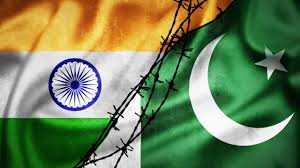India-Pakistan Conflict Escalates: A Dangerous Crossroads in South Asia
 |
| BBC |
The longstanding tensions between India and Pakistan have reached a critical juncture in May 2025, following a deadly attack on Indian tourists in Kashmir. The subsequent military responses from both nations have heightened fears of a broader conflict between these nuclear-armed neighbors.(Al Jazeera, Council on Foreign Relations)
The Catalyst: Pahalgam Attack
On April 22, 2025, a terrorist attack in Pahalgam, Indian-administered Kashmir, resulted in the deaths of 26 civilians, including 25 Indian tourists and one Nepali national. India attributed the attack to the Islamic Resistance Front, an offshoot of the Pakistan-based Lashkar-e-Taiba. Investigations revealed the involvement of Hashim Musa, a former member of Pakistan's Special Service Group, who had joined the banned terror group after his dismissal. (Wikipedia)
India's Response: Operation Sindoor
In retaliation, India launched "Operation Sindoor" on May 6, targeting nine sites in Pakistan and Pakistan-administered Kashmir, which it alleged were used to plan the attacks. The Indian government emphasized that the strikes were precise and avoided Pakistani military sites. (Council on Foreign Relations, Wikipedia)
Pakistan's Countermeasures
Pakistan condemned the Indian airstrikes as an act of war and vowed retaliation. The Pakistani military responded with drone strikes and artillery shelling across the Line of Control (LoC), leading to casualties on both sides. (AP News, Vox)
Diplomatic Fallout
The escalation has led to a significant deterioration in diplomatic relations. India suspended the Indus Waters Treaty and imposed visa and diplomatic restrictions. Pakistan, in turn, suspended the 1972 Shimla Agreement, closed its airspace to Indian aircraft, and halted all trade with India. (Wikipedia)
International Reactions
The international community has expressed deep concern over the escalating tensions. The United Nations urged both sides to exercise "maximum restraint" and resolve issues diplomatically. Iran offered to mediate between the two countries, with its top diplomat visiting both Islamabad and New Delhi. (Wikipedia, AP News)
Humanitarian Impact
The conflict has had severe humanitarian consequences. Over 20 airports in the region have been closed, affecting civilian travel. The UK Foreign Office updated its travel advice, advising against all travel to volatile regions and cautioning about possible airspace restrictions and flight disruptions. (The Times)
Historical Context
The roots of the India-Pakistan conflict trace back to the 1947 Partition of British India, which led to the creation of the two nations and the disputed status of Kashmir. The region has been a flashpoint for multiple wars and ongoing skirmishes. (Council on Foreign Relations, AP News)
The Nuclear Dimension
Both India and Pakistan possess nuclear weapons, adding a grave dimension to the current escalation. While both sides have historically avoided full-scale war due to the doctrine of mutually assured destruction, the current situation tests this delicate balance. (Vox)
Conclusion
The escalation between India and Pakistan in 2025 represents one of the most dangerous confrontations in recent history. The combination of military actions, diplomatic breakdowns, and the nuclear capabilities of both nations underscores the urgent need for de-escalation and dialogue. The international community's role in mediating and facilitating peaceful resolutions is more critical than ever.(Wikipedia)
Further Reading:
Note: This article is intended for informational purposes and reflects the situation as of May 9, 2025. Readers are encouraged to consult the latest news sources for ongoing developments.









0 Comments